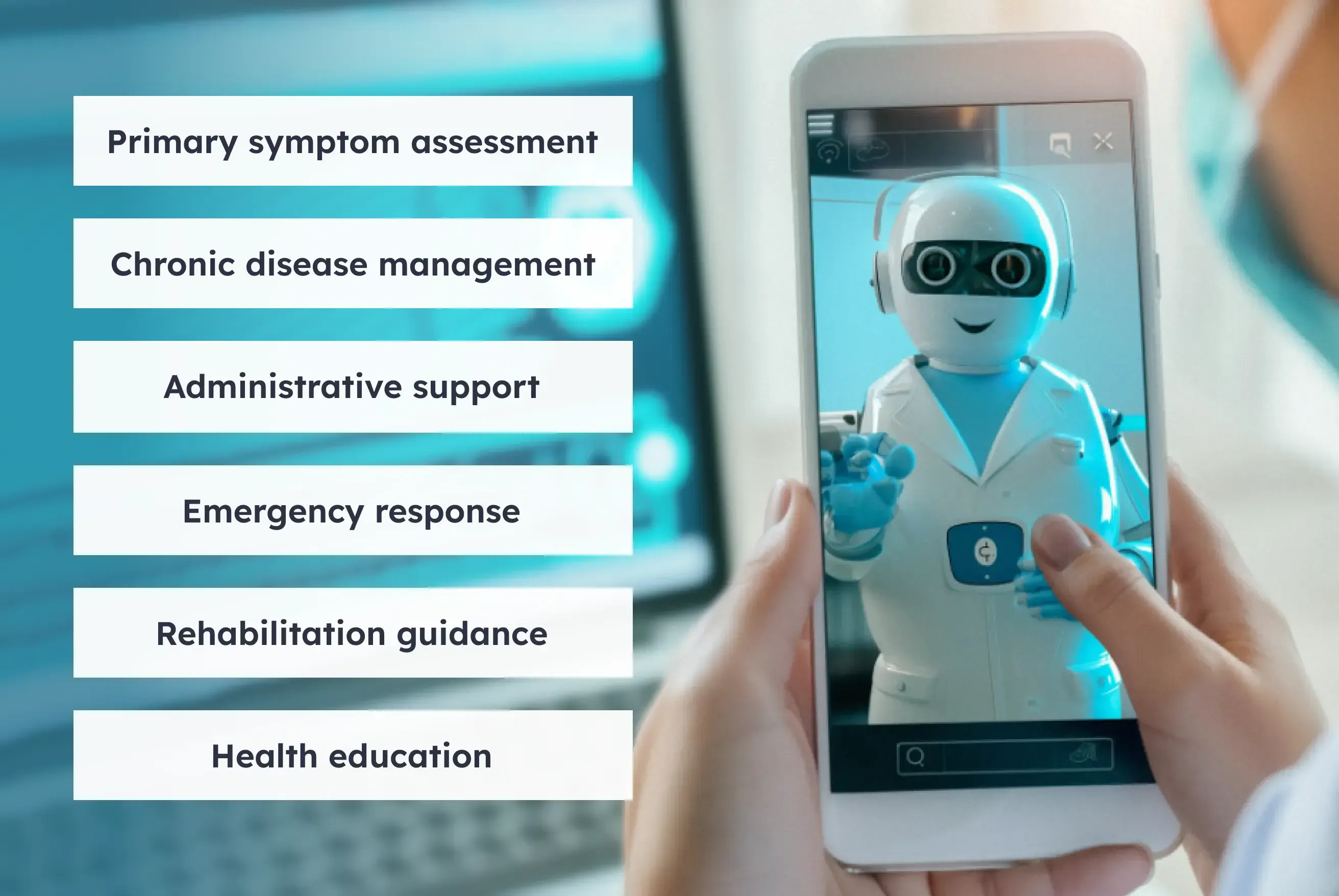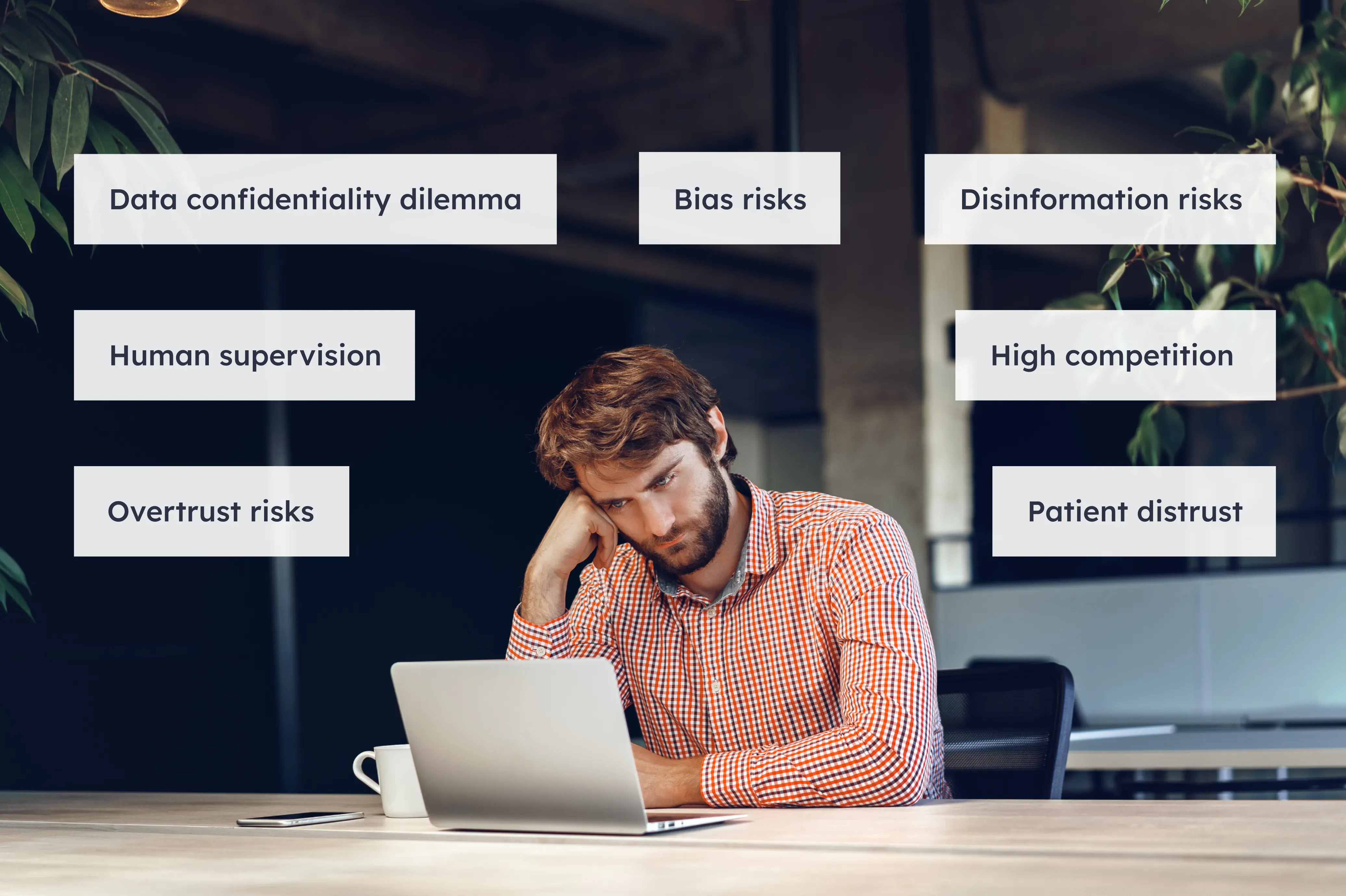
AI chatbots for healthcare providers: Application scenarios and barriers explored

Dr. Gleb Basalyga
PhD, Senior Machine Learning Engineer at Modsen
Saturday morning. The sun’s shining through the curtains, filling the room with early spring warmth. You wake up and take a bed stretch. Ouch, something hurts on the left. What might that be? You rush to the laptop to ask your AI chatbot companion Alex about the mysterious symptom. Alex accesses your medical history, swiftly analyzes the symptom, cross-references it with millions of medical cases worldwide, and within seconds, provides a comprehensive diagnosis. Seems like you need to consult a cardiologist. Without hesitation, Alex connects you with an online doctor, who remotely monitors your heart state in real-time. With Alex's guidance, you receive timely interventions and adjust your lifestyle to maintain optimal heart health. Happy ending.
If we lived in a perfect world, AI healthcare chatbots would act exactly like this. But while we’re far from perfection, we have to embrace the fact that any technology, whatever smart or sophisticated it is, has an Achilles’ hill.
In this article, we’re covering the real-life applications of AI chatbots for healthcare providers and focusing on the range of constraints the incorporation of virtual AI assistants implies. Get ready for a deep dive.
Real-life AI chatbot use cases in healthcare

The range of services AI chatbots can provide grows exponentially, fuelled by the advancements in AI technology, wider integration with healthcare systems, and increased patient engagement. Here’s a comprehensive overview of AI healthcare assistants’ utilization scenarios available to date.
Patient care and assistance
Primary symptom assessment
The incorporation of an AI chatbot into your website interface will create a massive competitive advantage based on the speed at which a patient can have one’s symptoms assessed and analysed. Prompt response and guidance provided by AI will tip the scales in your favour if a doctor’s consultation is required.
The AI chatbot symptom-checking segment holds a significant market share, accounting for over 37% of total revenue.
Medication reminders and drug interaction checking
If given access to patients’ EMRs, AI assistants can send medication reminders to ensure they adhere to a prescribed treatment plan. In case an individual has to follow more than one medication plan, chatbots can analyse the drug regimen and flag potential treatment conflicts, helping to prevent medication errors and improve patient safety.
Telehealth services facilitation
Telehealth services are gaining traction as an attempt to make healthcare services more accessible and cost-effective for all parties involved. AI assistants facilitate telehealth consultations by collecting relevant patient information and connecting them with relevant healthcare professionals.
Remote patient monitoring
Combining AI and IoT technologies allows for effective off-premises patient supervision. AI bots can collect and analyse patient data from wearable devices, in-home sensors, and mobile apps to monitor the vital signs and overall health status of patients. Remote patient monitoring is a service highly requested for senior patients and individuals with severe ailments who are receiving medical treatment at home.
Chronic disease management
Patients with chronic conditions require regular medical attention no less than personalized guidance on avoiding bouts and stopping them before they get life-threatening. AI assistants can act as personal data-based chronic disease management counsellors available within a couple of clicks.

Post-hospital discharge care
At some point, any inpatient facility might face a capacity shortage. For patients who still require medical supervision but don’t necessarily have to stay at the hospital, AI bots can offer post-discharge health monitoring services, providing post-hospitalization instructions and promptly addressing any complications by alarming the assigned specialists.
Potential health risk assessment
Fuelling AI chatbots with comprehensive patient medical data, one’s lifestyle factors, and family history have the potential to find unobvious health risks at early stages, examine them, and exercise preventive measures to avoid their development.
Emergency response
AI chatbot emergency assistance can be utilized by providing first aid instructions to patients and their caregivers in case of critical health situations, guiding them to nearby emergency services, and alarming emergency responders.
Preoperative preparation
Before undergoing surgery, a patient should be carefully instructed on the preoperative rules one must follow. To drive out the human factor and cover any patient questions that might arise outside of the hospital, AI assistants can be used to guide patients through a preoperative journey, recommend dietary restrictions, and medication protocols ensuring they are adequately prepared for surgery.
Rehabilitation guidance
Rehabilitation of any kind is often a lengthy and difficult period during which it is vital to equip patients with the necessary information and guidelines on the most efficient way of recovery. AI bots can be of great help encouraging patients undergoing physical therapy or rehabilitation, offering custom exercise routines, dietary plans, and progress-tracking analytics.
Second opinion services
Human is to err. That’s why when it comes to making serious health decisions, listening to at least 3 opinions is recommended. If set up properly, AI bots can serve as a reliable source of unbiased expert advice, treatment recommendations, and additional insights into existing healthcare options.
Health insurance advice
Patients often get tangled up in the red tape of health insurance companies. Having an AI chatbot assistant at hand, patients could have a better grip on their health insurance coverage, eligibility requirements, and claims processes, helping them maximize their health benefits.
Patient engagement and support

Health education
Ignorance of basic healthcare principles and limited access to healthcare providers are the unfortunate trends driving chronic disease acquisition rates. The incorporation of AI assistants into hospitals’ web interfaces can provide patients with personalized health education resources, offering information on medical conditions, treatments, preventive measures, and healthy lifestyle habits.
Mental health support and screening
According to statistical sources, 1 in 2 people in the world develops a mental health disorder at some point in their lifetime. With telehealth solutions, psychological and psychiatric help has become more accessible and AI chatbots further this trend. Virtual assistants can offer mental health support by providing resources, coping strategies, and guidance on managing stress, anxiety, depression, and other mental health concerns. Apart from patient assistance, AI bots can also be trained to administer mental health screening assessments and provide referrals to mental health professionals for further evaluation and treatment.
Wellness programs
Sometimes, a pinch of motivation from the outside is all we need to start living a healthier life. AI chatbots have the power both to administer wellness programs and positively encourage users to engage in healthy behaviours, track progress, and achieve their health goals.
Administrative assistance
Appointment scheduling
Apart from reducing the need for appointment booking personnel, AI chatbots have the potential to cut the percentage of unnecessary patient visits by answering their queries if cases do not require highly qualified medical personnel to be involved.
The utilization of AI chatbots for appointment scheduling is projected to experience significant growth, with a compound annual growth rate of 25% from 2023 to 2030.
Language interpretation
An average clinic’s staff rarely includes medical professionals with proficiency in several languages to cover the needs of foreign-speaking patients. AI-powered assistants eliminate the occasional need for interpreters and help avoid misunderstandings, which are unacceptable when it comes to health issues.
Administrative support
As we’ve stated in our article about AI chatbot benefits for healthcare providers, administrative staff accounts for roughly 15-30% of a clinic’s personnel. The integration of AI bots will streamline administrative tasks in healthcare facilities by administering patient registration, verifying insurance data, processing billing inquiries, and performing other administrative tasks upon necessity.
Medical research and trials
In the field of clinical research, AI chatbots prove useful by recruiting participants for clinical trials, collecting data, and answering questions about research studies and trial eligibility, helping to drive transformative healthcare industry advancements.
Healthcare services quality improvement
Integration of AI assistants into a healthcare business workflow opens up significant service delivery enhancing opportunities by collecting and impartially analysing patient feedback, assessing satisfaction levels, and identifying growth points that can create a range of competitive advantages invisible to the naked eye.
Limitations and obstacles to consider

When making a decision to develop a custom AI chatbot for your healthcare business, make sure to be free of illusions virtual assistants are surrounded by. The capacity and potential of AI bots for healthcare is immense, given they are built and trained properly but even then, the incorporation of a digital assistant implies embracing certain risks. Here are the points for close consideration.
Data confidentiality dilemma
Ensuring the privacy of patient data and its secure processing by AI systems are the causes of major concerns both among healthcare providers and their patients. Storing and transmitting a great deal of sensitive patient data, AI chatbots might become a target for unauthorized access and breaches that could result in privacy violations, identity theft, and patient discrimination. That’s why ensuring robust data security measures, including encryption, access controls, and healthcare industry regulations compliance is crucial to safeguarding patient confidentiality and building trust in AI chatbot technology in healthcare.
Human supervision
AI chatbots enjoy substantial autonomy but it doesn’t imply that such systems can be left unsupervised. AI software can also make occasional mistakes, the consequences of which might be irreversible. Whatever sophisticated an AI chatbot may be, the necessity of high-profile human control, robust quality control, and adherence to regulatory requirements remain unshakable.
Got any questions about data product development?
We’re ready to cover all of them during a free expert consultation.
Dr. Gleb Basalyga
PhD, Senior Machine Learning Engineer at Modsen



Bias risks
Every year human bias in healthcare causes hundreds if not thousands of deaths that fall under the category of “medical error”. AI systems in healthcare are intended to significantly reduce such tragic cases but their total elimination is still far from reality. AI chatbots hold no magic superpowers – they are trained as humans, which means that mistake risks in symptom assessment or health recommendations persist if there is a gap in the data AI software was trained on.
Overtrust risks
Until AI became a fact of life, we all used to think of it as some super brain that holds universal knowledge and is not susceptible to errors. Today we know that the power of AI systems is still limited. Healthcare AI chatbots do not possess the depth of knowledge and nuanced expertise of human healthcare professionals, so they may struggle to accurately diagnose complex medical conditions or provide tailored treatment plans. Besides, bots depend on technology infrastructure and internet connectivity which are prone to occasional failures and thus may impact the delivery of healthcare services.
Disinformation risks
AI assistants are supposed to operate accurate and objective data but the question of reliable sources of medical knowledge remains open. As do the risks of disinformation through the artificial intelligence systems.
Patient distrust
Getting patients to entrust one’s health into the hands of a machine, whatever smart and knowledgeable it is, can be challenging. The impersonal nature of automated systems and their ability to make mistakes can cause distrust and lack of acceptance which are essential for the successful adoption of AI chatbots in healthcare settings.
High competition
AI technology is experiencing explosive development, leading to the creation of new more powerful AI solutions within a blink of an eye. Just like that, in November 2023, Microsoft released a study that shows the ability of ChatGPT-4 to outperform leading fine-tuned models for medical applications using Medprompt – a method that unites several prompting strategies into one.
The final thought
The incorporation of AI technology into your healthcare business workflow is a major step that requires an in-depth understanding of all the risks and complications, as well as the tremendous benefits associated with it. Make sure to have a trusted and seasoned AI software development partner by your side to guide you through this journey avoiding the challenges others stumble upon.

Get a weekly dose of first-hand tech insights delivered directly to your inbox